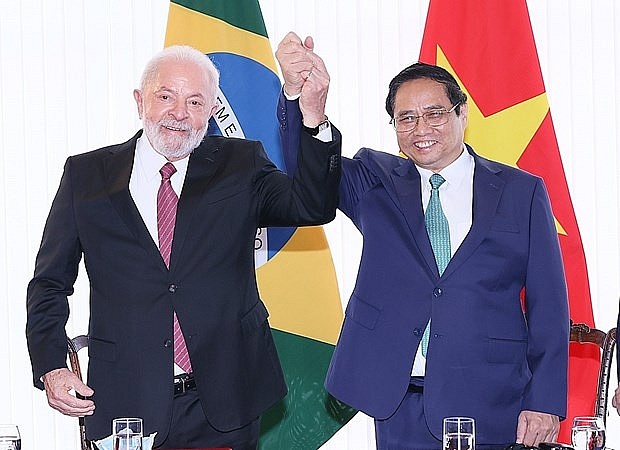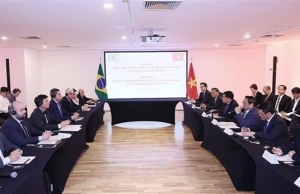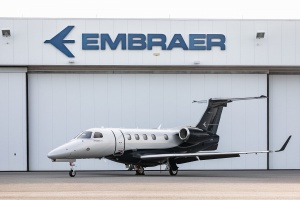Vietnam and Mercosur bloc inching to trade tie boost
During an official visit to Brazil last week, Prime Minister Pham Minh Chinh emphasised that a free trade agreement (FTA) between Vietnam and the Common Market of the South (Mercosur) would “lead to breakthroughs in economic, trade and investment cooperation between the two countries, bringing substantial benefits to businesses and peoples of both sides”.
 |
| Prime Minister Pham Minh Chinh (R) and Brazilian President Luiz Inácio Lula da Silva (Photo: VNA) |
The Vietnamese leader also proposed that Vietnam and Mercosur – which comprises Brazil, Argentina, Uruguay, and Paraguay – would soon begin negotiations on the FTA.
Mercosur is a high-potential market for various Vietnamese key consumer goods such as mobile phones and parts, electrical products, garments and textiles, and footwear.
“President Luiz Inácio Lula da Silva expressed the intention to discuss the matter with partners during the Brazilian presidency of Mercosur,” said a joint statement during the visit.
With the aim of increasing bilateral trade volume to $10 billion in 2025 and $15 billion in 2030, the leaders pledged to expand economic, trade and investment cooperation; promote the diversification of bilateral trade exchanges; promote cooperation on both sides in economics, trade and investment; promote closer links between businesses of both sides; and create better conditions for businesses to deepen cooperation in areas where the two sides can complement each other.
Bilateral trade last year hit 6.78 billion, up 6.6 per cent on-year and tripling over the past decade. In the first eight months of this year, the figure touched $4.44 billion, including Vietnam’s exports of $1.67 billion, up 11.8 per cent on-year; and imports of $2.77 billion, down 11.9 per cent on-year.
To amplify trade and investment ties, Brazil will soon open its commerce and industry chamber in Vietnam to study the market in service for businesses and investors.
PM Chinh also met with some large Brazilian groups, such as food processing firm BRF and multinational aerospace corporation Embraer.
He also visited Embraer’s headquarters in Sao Paulo, with Embraer president and CEO Francisco Gomes Neto expressing his hope for the Vietnamese government’s continued support for the group to seek cooperation opportunities and expand its market in the country. Neto said Embraer was ready to implement aircraft maintenance and repair services in and provide aerospace technological solutions for Vietnam.
Embraer is the world’s third-largest producer of commercial aircraft, after Boeing and Airbus, and strong at manufacturing under-130-seat planes. In Vietnam, it has handed over five E190 aircraft to Bamboo Airways.
According to Vietnam’s Ministry of Planning and Investment, as of August 20, Brazil had only six valid projects registered at $3.83 million.
Currently, Vietnamese agencies have been assigned to work with peers of Mercosur on negotiations of the FTA. Vietnam has completed an internal review related to the negotiations, expected to begin early next year at the latest.
Vietnam in October will provide more experts for the Vietnamese Trade Office in Brazil to help boost the negotiations.
“More can be done to drive trade even higher. An FTA between Vietnam and Mercosur could provide a broad range of opportunities for all parties involved. This may take some time to develop, but with impetus on both sides, it may not be too far off,” said pan-Asia consulting firm Dezan Shira & Associates.
By entering an FTA with Mercosur, Vietnamese businesses and manufacturers could gain increased access to this sizable market, fostering greater trade and economic cooperation between the two regions, according to Dezan Shira.
“It would also align with growing interest in increasing trade among the world’s emerging economies, led by organisations of developing states like the BRICS grouping,” the firm said.
This so-called South-South trade movement is gaining momentum as countries recognise the mutual benefits of enhanced trade relations within these regions.
Last year, Mercosur’s two-way trade with Vietnam grew 9.2 per cent on-year to over $12 billion, including more than $3.3 billion worth of Vietnamese exports, up 3.4 per cent; and imports of $8.7 billion, up 11.6 per cent.
According to Vietnam’s Ministry of Industry and Trade, Mercosur’s nations are strong in producing and exporting farm produce, animal feed, industrial materials, natural minerals, while Vietnam’s exports to Mercosur include electronics and telecommunications equipment, garments and textiles, and footwear.
Thus, Vietnam and Mercosur are complementary in goods structure, and are not in direct competition. Currently, Mercosur has no preferential trade deal with nations that have goods that directly compete against Vietnam. Thus, an FTA will help boost exports from Vietnam to the Mercosur market.
The nations of Mercosur, established in 1991, boasted a combined GDP of roughly $5.1 trillion last year, according to World Bank data, making Mercosur one of the world’s largest economic blocs.
| Vietnamese and Brazilian leaders last week witnessed the signing ceremony of four documents of cooperation -Cooperation agreement on education; -Cooperation between the defence ministries of both nations; -A 2024-2026 action plan to implement agricultural cooperation between Vietnam’s Ministry of Agriculture and Rural Development and Brazil’s Ministry of Agriculture and Livestock; -A 2024-2025 action plan between Vietnam’s Diplomatic Academy and Brazil’s Rio Branco Institute. |
 | Vietnamese, Brazilian firms asked to work together to raise trade to 10 billion USD Prime Minister Pham Minh Chinh on September 24 asked Vietnamese and Brazilian businesses to concretise cooperation mechanisms with specific programmes and projects, with an aim to bring two-way trade turnover to 10 billion USD by 2025, and 15-20 billion USD by 2030 in a more balanced direction. |
 | Brazil's aerospace firm Embraer targets expansion in Vietnam Brazil's aerospace leader Embraer is strategically extending its operations in Vietnam, reflecting a wider ambition to intensify Brazil-Vietnam trade and technological partnerships. |
What the stars mean:
★ Poor ★ ★ Promising ★★★ Good ★★★★ Very good ★★★★★ Exceptional
Related Contents
Latest News
More News
- Haiphong gains new growth impetus from strategic planning and integrated infrastructure (February 27, 2026 | 16:40)
- Kurz Vietnam expands Gia Lai factory (February 27, 2026 | 16:37)
- SK Innovation-led consortium wins $2.3 billion LNG project in Nghe An (February 25, 2026 | 07:56)
- THACO opens $70 million manufacturing complex in Danang (February 25, 2026 | 07:54)
- Phu Quoc International Airport expansion approved to meet rising demand (February 24, 2026 | 10:00)
- Bac Giang International Logistics Centre faces land clearance barrier (February 24, 2026 | 08:00)
- Bright prospects abound in European investment (February 19, 2026 | 20:27)
- Internal strengths attest to commitment to progress (February 19, 2026 | 20:13)
- Vietnam, New Zealand seek level-up in ties (February 19, 2026 | 18:06)
- Untapped potential in relations with Indonesia (February 19, 2026 | 17:56)

 Tag:
Tag:


















 Mobile Version
Mobile Version